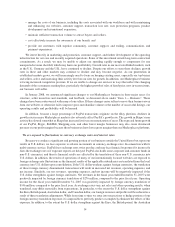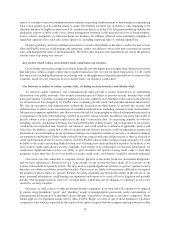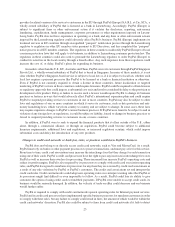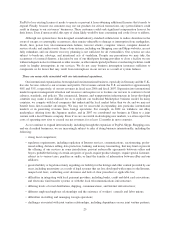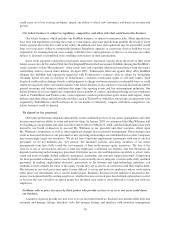eBay 2007 Annual Report Download - page 30
Download and view the complete annual report
Please find page 30 of the 2007 eBay annual report below. You can navigate through the pages in the report by either clicking on the pages listed below, or by using the keyword search tool below to find specific information within the annual report.confidential information via email or download a program. Despite our efforts to mitigate “spoof” emails through
product improvements and user education, “spoof” and “phishing” remain a serious problem that may damage our
brand, discourage use of our websites, and increase our costs.
Changes in regulations or user concerns regarding privacy and protection of user data could adversely
affect our business.
We are subject to laws relating to the collection, use, retention, security and transfer of personally identifiable
information about our users, especially for financial information and for users located outside of the U.S. In many
cases, these laws apply not only to third-party transactions but also to transfers of information between ourselves
and our subsidiaries, and between ourselves, our subsidiaries, and other parties with which we have commercial
relations. New laws in this area have been passed by several jurisdictions, and other jurisdictions are considering
imposing additional restrictions. The interpretation and application of user data protection laws are in a state of flux.
These laws may be interpreted and applied inconsistently from country to country and our current data protection
policies and practices may not be consistent with those interpretations and applications. Complying with these
varying international requirements could cause us to incur substantial costs or require us to change our business
practices in a manner adverse to our business. In addition, we have and post on our websites our own privacy
policies and practices concerning the collection, use and disclosure of user data. Any failure, or perceived failure, by
us to comply with our posted privacy policies or with any regulatory requirements or orders or other federal, state or
international privacy or consumer protection-related laws and regulations could result in proceedings or actions
against us by governmental entities or others, subject us to significant penalties and negative publicity and adversely
affect us. In addition, as noted above, we are subject to the possibility of security breaches, which themselves may
result in a violation of these laws.
Our revenue from advertising is subject to factors beyond our control.
We derive an increasing portion of our revenues from advertising on our websites. Revenues from online
advertising are sensitive to events and trends that affect advertising expenditures, such as general changes in the
economy and changes in consumer spending, as well as the effectiveness of online advertising versus offline
advertising media and the value our websites provide to advertisers relative to other websites. If we experience a
reduction in our advertising revenues due to economic, competitive or other factors, including if we are unable to
provide value to our advertisers, our business and financial results would suffer.
Our growth will depend on our ability to develop our brands, and these efforts may be costly.
Our historical growth has been largely attributable to word of mouth, and to frequent and high visibility
national and local media coverage. We believe that continuing to strengthen our brands will be critical to achieving
widespread acceptance of our services, and will require an increased focus on active marketing efforts across all of
our brands. The demand for and cost of online and traditional advertising have been increasing, and may continue to
increase. Accordingly, we will need to spend increasing amounts of money on, and devote greater resources to,
advertising, marketing, and other efforts to create and maintain brand loyalty among users. Since 2004, we have
significantly increased the number of brands we are supporting, adding Rent.com, Shopping.com, Kijiji, StubHub,
and Skype, among others. Each of these brands requires its own resources, increasing the costs of our branding
efforts. Brand promotion activities may not yield increased revenues, and even if they do, any increased revenues
may not offset the expenses incurred in building our brands. Also, major search engine operators that we use to
advertise our brands have frequently-changing rules that govern their pricing, availability and placement of online
advertisement (e.g., paid search, keywords), and changes to these rules could negatively affect our use of online
advertising to promote our brands. If we do attract new users to our services, they may not conduct transactions
using our services on a regular basis. If we fail to promote and maintain our brands, or if we incur substantial
expenses in an unsuccessful attempt to promote and maintain our brands, our business would be harmed.
New and existing regulations could harm our business.
We are subject to the same foreign and domestic laws as other companies conducting business on and off the
Internet. It is not clear how existing laws governing issues such as property ownership, copyrights, trademarks and
20






